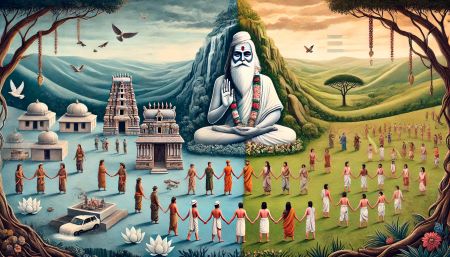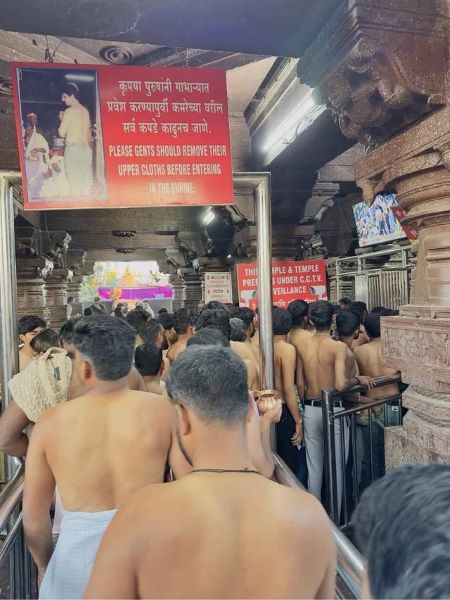Examining the Ideological Divide Between Equality and Tradition
On 31st December 2024, while inaugurating a conference as part of the Sivagiri pilgrimage, Pinarayi Vijayan supported Swami Satchitanand’s proposal to stop the practice of removing shirts and keeping the torso bare while entering temples.

Pinarayi Vijayan inaugurating the 92nd Sivagiri Pilgrimage
It is believed that this practice originated to identify those wearing the sacred thread, an upper-caste privilege. While some doubt this reasoning, it is unlikely that there was any other purpose for keeping the torso uncovered. Those not wearing the sacred thread were prohibited from entering temples.
Vijayan also noted that there are ongoing efforts to claim that Narayan Guru was part of the Sanatan tradition. However, Guru was far removed from it, as he propagated the idea of “one caste, one religion, one God.” This principle of equality, irrespective of caste or religion, contrasts starkly with the core tenets of Sanatan Dharma.
Vijayan highlighted the relevance of Guru’s life and work in today’s context, where violence is often orchestrated by inciting religious sentiments. Guru was not merely a religious leader but a great humanist.

Sree Narayana Guru
Critics of Vijayan allege that during his tenure as Chief Minister, Hindus have been targeted. They cite the example of Sabarimala, where the ruling party supported the Supreme Court’s decision to allow women of menstrual age to enter the sacred temple. BJP spokespersons have accused Vijayan of insulting Sanatan Dharma in this context as well.
The debate around Sanatan Dharma resurfaced prominently when Dayanidhi Stalin spoke against it. BJP-RSS claims that Sanatan cannot be reduced to caste and the Chaturvarnya system.
Notably, in 2022, Kerala submitted a float for the Republic Day parade featuring Narayan Guru. The Defense Ministry’s jury, however, stated that Kerala should instead showcase Shankaracharya from Kaladi, leading to the float’s rejection.
Historically, Kerala once imposed a breast tax on women who covered their upper bodies.
The term Sanatan means eternal and has been used in Buddhism, Jainism, and Hinduism. Hinduism, a religion with no single prophet or holy book, does not mention the term Hindu in its sacred texts. Hinduism comprises two major streams: Brahmanism and Shramanism.
Brahmanism is rooted in graded inequality and patriarchal values, which Dr. Ambedkar renounced, calling it a system dominated by Brahmanical principles. Shramanic traditions, including Nath, Ajivikas, Tantra, and Bhakti movements, stand apart with their rejection of inequality.

Sanatan Dharma
Today, Sanatan Dharma and Hindu Dharma are often used interchangeably. Some ideologues argue that Hinduism is not a religion but a way of life based on Dharma. For them, Dharma refers to religiously ordained duties rather than religion.
However, social reformers have opposed religions based on inequality, as seen in the works of Ambedkar, who revered Buddha, Kabir, and Jotirao Phule.
Medieval saints like Kabir, Tukaram, Namdeo, and Narsi Mehta opposed the caste system and faced persecution from upper-caste rulers.
Similarly, Narayan Guru emerged as a social reformer who challenged caste divisions and transcended religious divides. His contributions include establishing schools and temples open to all castes, echoing the efforts of Jotirao Phule and Ambedkar.
In 1888, Guru visited Aruvippuram, where he meditated and consecrated a rock from the river as an idol of Shiva, establishing the Aruvippuram Shiva Temple. This act, known as Aruvippuram Pratishta, sparked opposition from upper-caste Brahmins, who questioned Guru’s authority to consecrate an idol. Guru famously replied, “This is not a Brahmin Shiva but an Ezhava Shiva,” a statement that became a rallying cry against casteism.
Swami Satchitanand’s recent suggestion, supported by Pinarayi Vijayan, also highlighted that a bare torso could be unhygienic and may transmit diseases. This practice, like others, needs to evolve with time.

Historically, Kerala once imposed a breast tax on women who covered their upper bodies. This dehumanizing practice was abolished during Tipu Sultan’s rule, allowing women to reclaim their dignity.
Temples are integral to community life, and changes in dress codes must align with evolving social norms. Resistance to such changes is akin to turning back the clock. Religious politics often obstructs social and political progress.
Kerala, a land of contrasts, was also where Shankaracharya debated Buddhists, arguing for an idealist philosophy while Buddhists emphasized materialism and real-world issues.
In contemporary times, India, including Kerala, must embrace the values of saints like Narayan Guru and Kabir, whose humanistic principles fostered social harmony and progress. The conservative “status quo” mindset hampers social transformation. ![]()
Also Read: The Purpose of Religion
Disclaimer : PunjabTodayNews.com and other platforms of the Punjab Today group strive to include views and opinions from across the entire spectrum, but by no means do we agree with everything we publish. Our efforts and editorial choices consistently underscore our authors’ right to the freedom of speech. However, it should be clear to all readers that individual authors are responsible for the information, ideas or opinions in their articles, and very often, these do not reflect the views of PunjabTodayNews.com or other platforms of the group. Punjab Today does not assume any responsibility or liability for the views of authors whose work appears here.
Punjab Today believes in serious, engaging, narrative journalism at a time when mainstream media houses seem to have given up on long-form writing and news television has blurred or altogether erased the lines between news and slapstick entertainment. We at Punjab Today believe that readers such as yourself appreciate cerebral journalism, and would like you to hold us against the best international industry standards. Brickbats are welcome even more than bouquets, though an occasional pat on the back is always encouraging. Good journalism can be a lifeline in these uncertain times worldwide. You can support us in myriad ways. To begin with, by spreading word about us and forwarding this reportage. Stay engaged.
— Team PT

